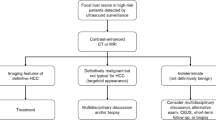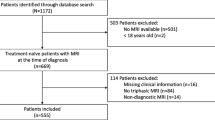Abstract
Purpose
Alpha-fetoprotein (AFP) and des-γ-carboxy prothrombin (DCP) are prognostic factors for hepatocellular carcinoma (HCC). The impact of these tumor markers in recurrent HCC on the prognosis remains to be fully elucidated.
Methods
Two hundred and seventeen patients whose AFP and DCP levels were measured at recurrence were enrolled in the present study. AFP levels >10 ng/mL and DCP levels ≥40 mAU/mL were defined as AFP positive (AFP+) and DCP positive (DCP+), respectively. The patterns of tumor markers were scored as AFP−/DCP−, 0; AFP+/DCP− or AFP−/DCP+, 1 and AFP+/DCP+, 2.
Results
The median survival period after recurrence in patients with a score of 2 (26.6 months) was significantly lower than that in patients with scores of 1 or 0 (43.5 months, P < 0.01; 75.3 months, P < 0.01, respectively). A multivariate analysis showed that a tumor marker score of 2 at recurrence was an independent predictor for poor survival after recurrence (hazard ratio 2.12, P = 0.03). The prognosis after recurrence in the patients with a decreased tumor maker score was significantly better than that in the patients with no change in the tumor marker score compared to the primary surgery (P = 0.048).
Conclusions
The present study shows that measurements of both AFP and DCP are useful for predicting the prognosis of recurrent HCC.



Similar content being viewed by others
References
Jemal A, Bray F, Center MM, Ferlay J, Ward E, Forman D. Global cancer statistics. CA Cancer J Clin. 2011;61:212–36.
Shimada M, Takenaka K, Gion T, Fujiwara Y, Kajiyama K, Maeda T, et al. Prognosis of recurrent hepatocellular carcinoma: a 10-year surgical experience in Japan. Gastroenterology. 1996;111:720–6.
Poon RT, Fan ST, Lo CM, Liu CL, Wong J. Intrahepatic recurrence after curative resection of hepatocellular carcinoma: long-term results of treatment and prognostic factors. Ann Surg. 1999;229:216–22.
Kobayashi K, Ishiyama K, Ohdan H. Prevention of recurrence after curative treatment for hepatocellular carcinoma. Surg Today. 2013;43:1347–54.
Liaw YF, Tai DI, Chu CM, Lin DY, Sheen IS, Chen TJ, et al. Early detection of hepatocellular carcinoma in patients with chronic type B hepatitis: a prospective study. Gastroenterology. 1986;90:263–7.
Debruyne EN, Delanghe JR. Diagnosing and monitoring hepatocellular carcinoma with alpha-fetoprotein: new aspects and applications. Clin Chim Acta. 2008;395:19–26.
Liebman HA, Furie BC, Tong MJ, Blanchard RA, Lo KJ, Lee SD, et al. Des-gamma-carboxy (abnormal) prothrombin as a serum marker of primary hepatocellular carcinoma. N Engl J Med. 1984;310:1427–31.
Okuda H, Obata H, Nakanishi T, Furukawa R, Hashimoto E. Production of abnormal prothrombin (des-gamma-carboxy prothrombin) by hepatocellular carcinoma. A clinical and experimental study. J Hepatol. 1987;4:357–63.
Shimada M, Takenaka K, Fujiwara Y, Gion T, Kajiyama K, Maeda T, et al. Des-gamma-carboxy prothrombin and alpha-fetoprotein positive status as a new prognostic indicator after hepatic resection for hepatocellular carcinoma. Cancer. 1996;78:2094–100.
Nakao A, Taniguchi K, Inoue S, Harada A, Nonami T, Watanabe K, et al. Usefulness of simultaneous determination of alpha-fetoprotein and des-gamma-carboxy prothrombin in hepatocellular carcinoma. Semin Surg Oncol. 1996;12:160–3.
Yamamoto K, Imamura H, Matsuyama Y, Hasegawa K, Beck Y, Sugawara Y, et al. Significance of alpha-fetoprotein and des-gamma-carboxy prothrombin in patients with hepatocellular carcinoma undergoing hepatectomy. Ann Surg Oncol. 2009;16:2795–804.
Kaibori M, Matsui Y, Yanagida H, Yokoigawa N, Kwon AH, Kamiyama Y. Positive status of alpha-fetoprotein and des-gamma-carboxy prothrombin: important prognostic factor for recurrent hepatocellular carcinoma. World J Surg. 2004;28:702–7.
Hirohashi K, Shuto T, Kubo S, Tanaka H, Yamamoto T, Ikebe T, et al. Prognostic factors after recurrence of resected hepatocellular carcinoma associated with hepatitis C virus. J Hepatobiliary Pancreat Surg. 2001;8:81–6.
Sobin LH, Gospodarowicz MK, Wittekind CH, editors. TNM Classification of Malignant Tumours. 7th ed. New York: Wiley-Liss; 2009.
The Japan Society of Hepatology. Clinical Practice Guidelines for Hepatocellular Carcinoma 2013 (in Japanese). Tokyo: Kanehara and Co., Ltd; 2013.
Ohba T, Yano T, Yoshida T, Kawano D, Tsukamoto S, Shoji F, et al. Results of a surgical resection of pulmonary metastasis from hepatocellular carcinoma: prognostic impact of the preoperative serum alpha-fetoprotein level. Surg Today. 2012;42:526–31.
Tomimaru Y, Wada H, Eguchi H, Tomokuni A, Hama N, Kawamoto K, et al. Clinical significance of surgical resection of metastatic lymph nodes from hepatocellular carcinoma. Surg Today. 2014. doi:10.1007/s00595-014-1028-8.
Nakashima T, Kojiro M. Pathologic characteristics of hepatocellular carcinoma. Semin Liver Dis. 1986;6:259–66.
Kasahara A, Hayashi N, Mochizuki K, Takayanagi M, Yoshioka K, Kakumu S, et al. Risk factors for hepatocellular carcinoma and its incidence after interferon treatment in patients with chronic hepatitis C. Hepatology. 1998;27:1394–402.
Ikeda K, Saitoh S, Suzuki Y, Kobayashi M, Tsubota A, Fukuda M, et al. Interferon decreases hepatocellular carcinogenesis in patients with cirrhosis caused by the hepatitis B virus: a pilot study. Cancer. 1998;82:827–35.
Shiratori Y, Shiina S, Imamura M, Kato N, Kanai F, Okudaira T, et al. Characteristic difference of hepatocellular carcinoma between hepatitis B- and C-viral infection in Japan. Hepatology. 1995;22:1027–33.
Miyagawa S, Kawasaki S, Makuuchi M. Comparison of the characteristics of hepatocellular carcinoma between hepatitis B and C viral infection: tumor multicentricity in cirrhotic liver with hepatitis C. Hepatology. 1996;24:307–10.
Yamanaka N, Tanaka T, Tanaka W, Yamanaka J, Yasui C, Kuroda N, et al. Correlation of hepatitis virus serologic status with clinicopathologic features in patients undergoing hepatectomy for hepatocellular carcinoma. Cancer. 1997;79:1509–15.
Wu CC, Ho WL, Chen JT, Tang JS, Yeh DC, P’eng FK. Hepatitis viral status in patients undergoing liver resection for hepatocellular carcinoma. Br J Surg. 1999;86:1391–6.
Koike Y, Shiratori Y, Sato S, Obi S, Teratani T, Imamura M, et al. Risk factors for recurring hepatocellular carcinoma differ according to infected hepatitis virus–an analysis of 236 consecutive patients with a single lesion. Hepatology. 2000;32:1216–23.
Kaibori M, Ishizaki M, Matsui K, Kwon AH. Clinicopathologic characteristics of patients with non-B non-C hepatitis virus hepatocellular carcinoma after hepatectomy. Am J Surg. 2012;204:300–7.
Toyoda H, Kumada T, Tada T, Niinomi T, Ito T, Kaneoka Y, et al. Prognostic significance of a combination of pre- and post-treatment tumor markers for hepatocellular carcinoma curatively treated with hepatectomy. J Hepatol. 2012;57:1251–7.
Kiriyama S, Uchiyama K, Ueno M, Ozawa S, Hayami S, Tani M, et al. Triple positive tumor markers for hepatocellular carcinoma are useful predictors of poor survival. Ann Surg. 2011;254:984–91.
Conflict of interest
The authors have no conflicts of interest to declare.
Author information
Authors and Affiliations
Corresponding author
Rights and permissions
About this article
Cite this article
Okamura, Y., Ashida, R., Ito, T. et al. The tumor marker score is an independent predictor of survival in patients with recurrent hepatocellular carcinoma. Surg Today 45, 1513–1520 (2015). https://doi.org/10.1007/s00595-014-1102-2
Received:
Accepted:
Published:
Issue Date:
DOI: https://doi.org/10.1007/s00595-014-1102-2




